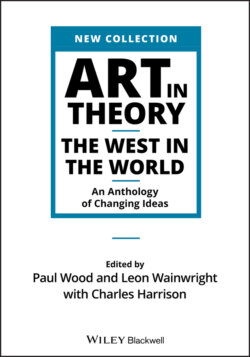Читать книгу Art in Theory - Группа авторов - Страница 102
IIA4 Charles‐Louis de Secondat, Baron de Montesquieu (1689–1755) from Persian Letters
ОглавлениеMontesquieu’s De l’esprit des lois (The Spirit of Laws), first published anonymously in Geneva in 1748, is one of the foundational documents of the European Enlightenment. Previously, in 1721, Montesquieu had given a new twist to the genre of the epistolary novel so that he could air many of his key themes (such as a need for openness in philosophical and scientific enquiry and the impact of environment on human character) in fictional form, so as to avoid censure by forces of the absolutist state and the church. His Persian Letters used the device of seeing a culture through the eyes of strangers in order to cast a new light on its habits, preoccupations and blind spots. His protagonists, the Persian travellers Usbek and Rica are in Paris on a quest to broaden their horizons during the relatively liberal period of the Regency, which followed the death of Louis XIV in 1715. During the course of the novel, Usbek and Rica experience tension between their own inherited cultural values and the European Enlightenment values they encounter, but particularly early on, they can only describe the external forms of various matters which seem opaque to them. In Letter 34, Usbek writes to a friend in Venice about a series of strange disputes he has encountered among intellectuals. Montesquieu’s point here is to call attention to the ‘Quarrel of the Ancients and Moderns’, a long‐running dispute spanning the late seventeenth and early eighteenth centuries about the relative importance of classical antiquity and modernity. (For a selection of texts, see Art in Theory 1648–1815, Section IA passim) In the letter, Usbek is puzzled by the intensity of the academic conflict over what to an outsider looks like a trivial matter; however, he notes that despite the apparently inconsequential nature of the work involved, a living can be made from it. A more recent manifestation can be found in disputes about the boundaries of the modern and the contemporary. Our extract is from Letter 34 of Persian Letters, translated by Margaret Mauldon with an introduction and notes by Andrew Kahn, Oxford: Oxford University Press, 2008, pp. 46–7.
Coffee is widely drunk in Paris: there are a great many public establishments where it is served. In some of these establishments news is disseminated; in others, people play chess: there is one place where coffee is prepared in such a manner as to sharpen the wits of those who drink it; at any rate, of those who emerge from there, not a single one fails to be convinced that he is four times cleverer than he was upon entering.
But what shocks me about these wits is that they give no service to their country, but fritter away their talents on childish things; for instance, when I arrived in Paris I found them all worked up over the most trivial dispute one could imagine: it concerned the reputation of an ancient Greek poet, whose land of birth and year of death have remained a matter of conjecture for two thousand years. Both sides admitted that he was an excellent poet: it was simply a question of the degree of excellence to be attributed to him. Everyone believed his own estimate the best, but among these bestowers of reputation, some thought the poet better than did others; that was the quarrel. It was very heated, for the two parties exchanged, with great cordiality, such crude insults and acidulous witticisms that I found the style of the dispute no less amazing than its subject. If anyone, I thought to myself, were foolish enough to appear before one of these defenders of the Greek poet and attack the reputation of some worthy citizen, he would undoubtedly be challenged; and I believe that this touchy fervour over the reputation of the dead would be kindled into a real conflagration in defence of the living; be that as it may, I added, may God protect me from ever drawing upon myself the enmity of these critics of a poet whom two thousand years in the tomb have been unable to defend against such implacable hatred: at the moment they beat the air, but what would happen if their fury were fuelled by the presence of an enemy?
Those whom I have just described to you argue in the vernacular, and one should not confuse them with certain other disputants, who employ a barbaric tongue which seems somehow to add to the fury and obstinacy of the combatants; there are places where one finds a kind of dense, black confusion of such people; they feed on fine distinctions; they live on obscure reasoning and false inferences; that occupation, whose devotees ought to be starving, does nevertheless yield a livelihood.
